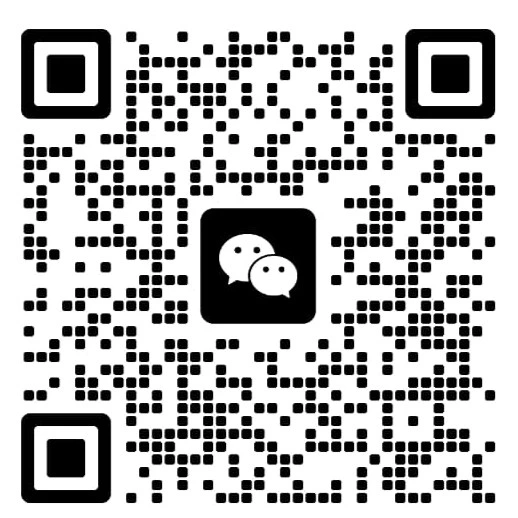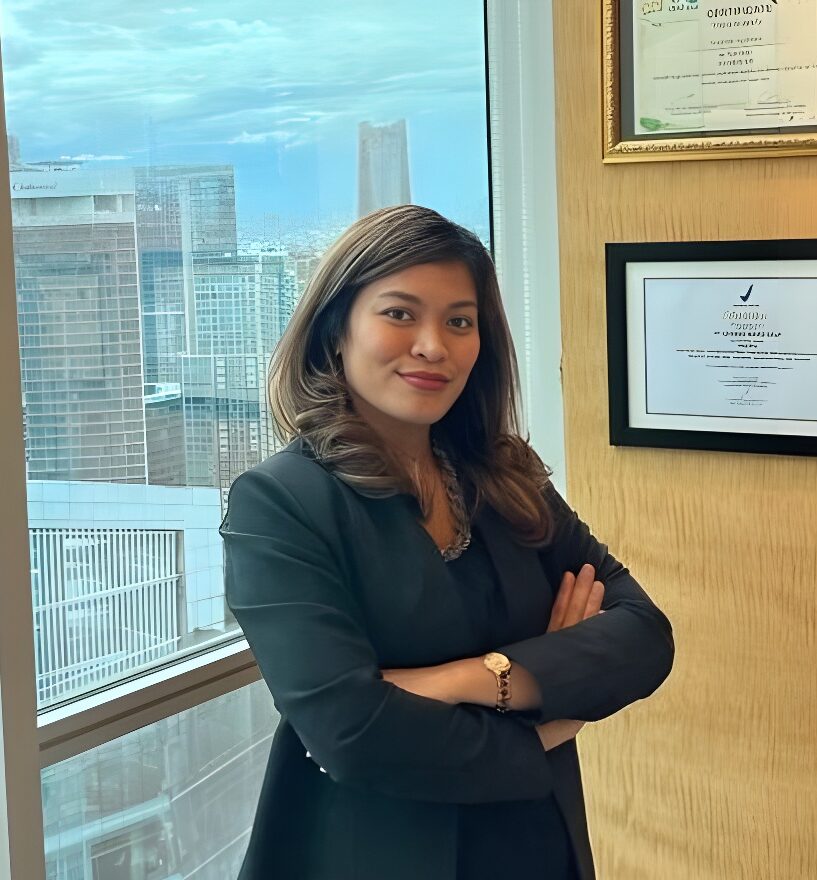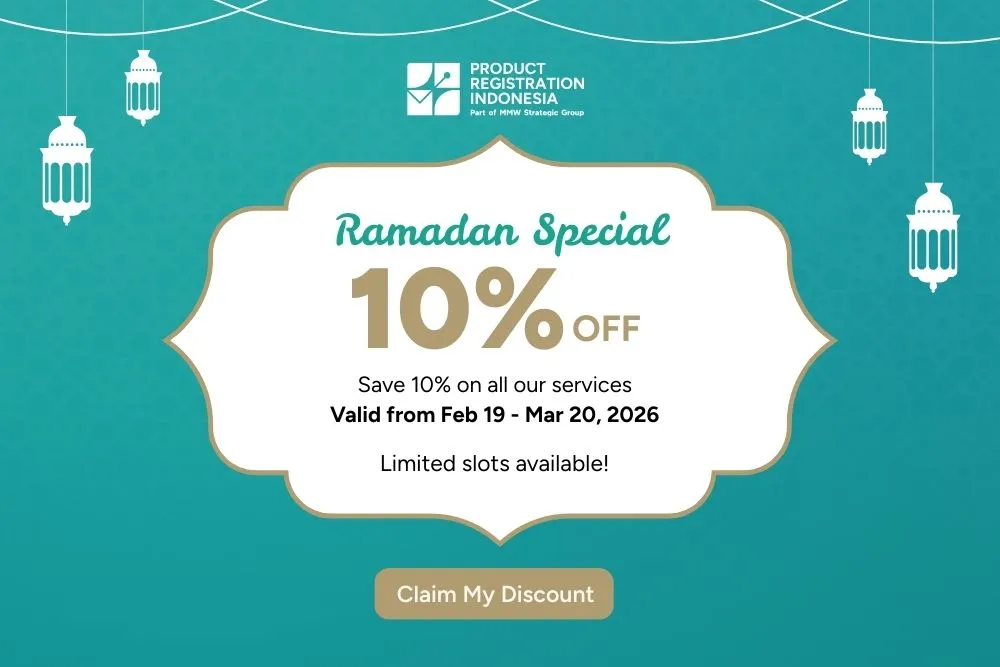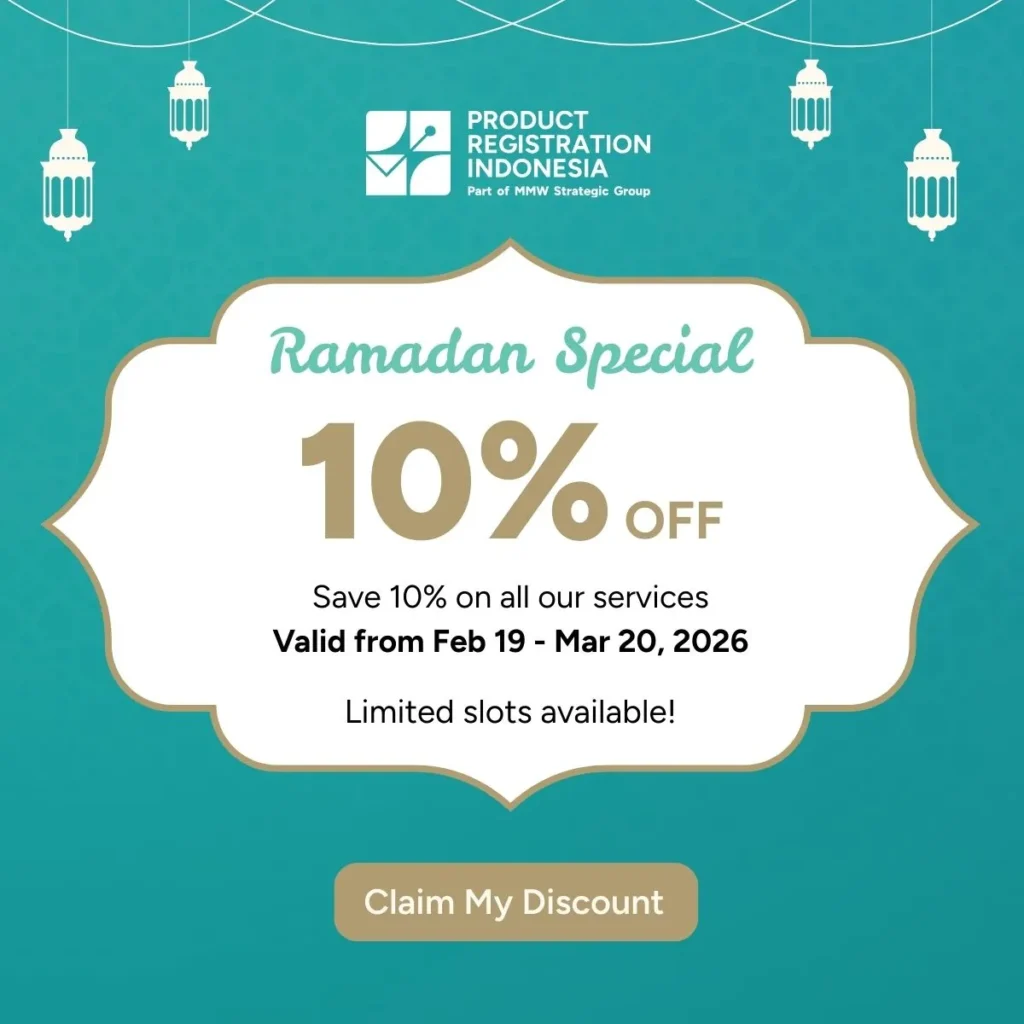インドネシアにおける天然・オーガニック化粧品の法的要件
インドネシア市場にナチュラル・オーガニック化粧品を投入するには、規制要件に関する十分な知識が必要です。インドネシアでは、「ナチュラル」または「オーガニック」と表示されているものも含め、すべての化粧品は、化粧品製造管理局(BPOM)に登録する必要があります。インドネシアの化粧品市場は、2024年には年間4兆8610億米ドルの成長率で18億6000万米ドルに達すると予測されており、これらのコンプライアンス基準を満たすブランドにとって大きな可能性を秘めています。
このガイドでは、天然およびオーガニック化粧品に関する BPOM 要件に関する重要な情報を提供し、自信を持って規制の状況を把握できるように支援します。
インドネシアにおける化粧品の規制枠組み
インドネシアの規制枠組みは、すべての化粧品が消費者に届く前に安全で高品質であり、明確にラベル付けされていることを保証する。BPOMは、その監督において重要な役割を果たしている。 化粧品登録、適正製造基準(GMP)の遵守、およびラベル基準。天然およびオーガニック化粧品の場合、これらの規制は製品の安全性、成分の透明性、そして多くの場合、 ハラール認証.
BPOM 基準を満たすことは、ブランドの市場参入を正当化するだけでなく、安全性と倫理基準の遵守を重視するインドネシアの消費者の信頼を高めることにもつながります。
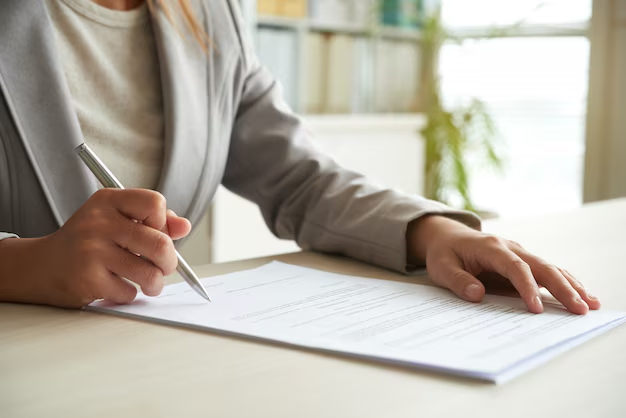
ナチュラル・オーガニック化粧品の主な要件
1. BPOM登録
インドネシアで化粧品を販売するには、各製品をBPOMに登録する必要があります。登録に必要な書類は以下のとおりです。
- 記入済みの申請書
- 成分リストと製品構成の詳細
- 安全性評価報告書
- 製品サンプル
- 分析証明書
- インドネシアにおける商標登録(該当する場合)
- 会社の法的文書および倉庫情報
この登録により、BPOM は製品の配合と使用目的に関する包括的な詳細情報にアクセスできるようになります。
2. 製品通知
登録された化粧品は、市場に出る前にBPOMに正式に届け出る必要があります。この手続きにより、BPOMは製品を効果的に監視し、インドネシアで求められる安全性と品質基準を満たしていることを確認できます。
3. 生産ライセンス
製造業者は、自社の施設がGMP基準を遵守していることを確認する製造ライセンスを取得する必要があります。このライセンスは、製品が安全に製造され、品質基準を満たしていることを証明するものです。
4. 輸入者識別番号(API)
インドネシアに化粧品を輸入する企業は、輸入業者が製品を合法的にインドネシアに持ち込むことを認可するAPIを取得する必要があります。APIは、インドネシア市場におけるすべての輸入化粧品の検証と監視に役立ちます。
5. ハラール認証(該当する場合)
イスラム教徒の消費者をターゲットにした化粧品の場合、 ハラール認証 多くの場合、ハラール認証は不可欠です。ハラール認証を受けた製品は、インドネシアでは重要な考慮事項であるイスラムの食生活と倫理のガイドラインに準拠しています。
インドネシアにおける化粧品の表示要件
インドネシアで販売されるすべての化粧品は、厳格な表示基準を遵守する必要があります。表示には以下の内容を含める必要があります。
- 製品名
- 機能と使用方法の説明
- 原材料の全リスト
- 製造業者および輸入業者の名称および住所
- バッチ番号と有効期限
- BPOM登録番号
ラベルには、潜在的なアレルゲンや刺激物も記載する必要があり、製品がインドネシア語の透明性要件に準拠していることを確認する必要があります。
BPOM登録の有効期限
BPOM登録の有効期間は3年間です。この期間が経過した後、インドネシア市場での販売を継続するには、登録を更新する必要があります。市場でのプレゼンスを維持するには、最新の認証と文書を維持することが不可欠です。
化粧品のBPOM登録手順
BPOM 登録プロセスには次の手順が含まれます。
- 文書の準備
上記の必要書類をすべて揃えてください。それぞれの書類が、スムーズな登録を保証する包括的な申請書類となります。 - BPOMへの提出
申請書類一式は、BPOMに直接、郵送、またはオンラインで提出してください。処理の遅延を避けるため、書類の不備がないか必ずご確認ください。 - 登録料の支払い
化粧品1品あたり約500万ルピアの登録料をお支払いください。登録を完了するために領収書が必要となりますので、必ず保管してください。 - 申請の審査と承認
BPOMは14日以内に申請を審査しますが、複雑なケースでは最大2か月かかる場合があります。承認後、BPOMは書面による確認書を発行します。 - 登録証明書の発行
承認されると、BPOMは3年間有効な登録証明書を発行します。企業は有効期限を確認し、適時に更新できるよう準備する必要があります。
コンプライアンスのメリット
インドネシアにおいてBPOMとハラール基準を遵守することは、合法的な市場参入を保証するだけでなく、消費者の信頼を高めることにもつながります。天然由来成分やオーガニック化粧品の需要が高まるにつれ、透明性、安全性、そして認証を重視するブランドは、インドネシアの化粧品市場で際立っています。
なぜインドネシアの製品登録を選ぶのですか?
Product Registration Indonesiaでは、インドネシア市場に参入する企業の規制手続きを簡素化します。当社の専門知識は、 化粧品, 医療機器, 食べ物と飲み物, サプリメント、 そして 家庭用品エンドツーエンドのサポートにより、複雑な規制コンプライアンスに対応し、お客様がビジネスの成長に集中できるようにします。
BPOM 登録にはどのくらいの時間がかかりますか?
BPOM 登録プロセスは、製品の複雑さに応じて通常 6 ~ 8 か月かかります。
BPOM 登録の有効期間はどのくらいですか?
化粧品のBPOM登録は3年間有効で、更新が可能です。
BPOM 登録なしで化粧品を販売できますか?
いいえ、国内製造か輸入品かを問わず、すべての化粧品は BPOM に登録する必要があります。
BPOM 登録の有効期限が切れるとどうなりますか?
インドネシアでの販売を継続するには、更新された書類で登録を更新する必要があります。

